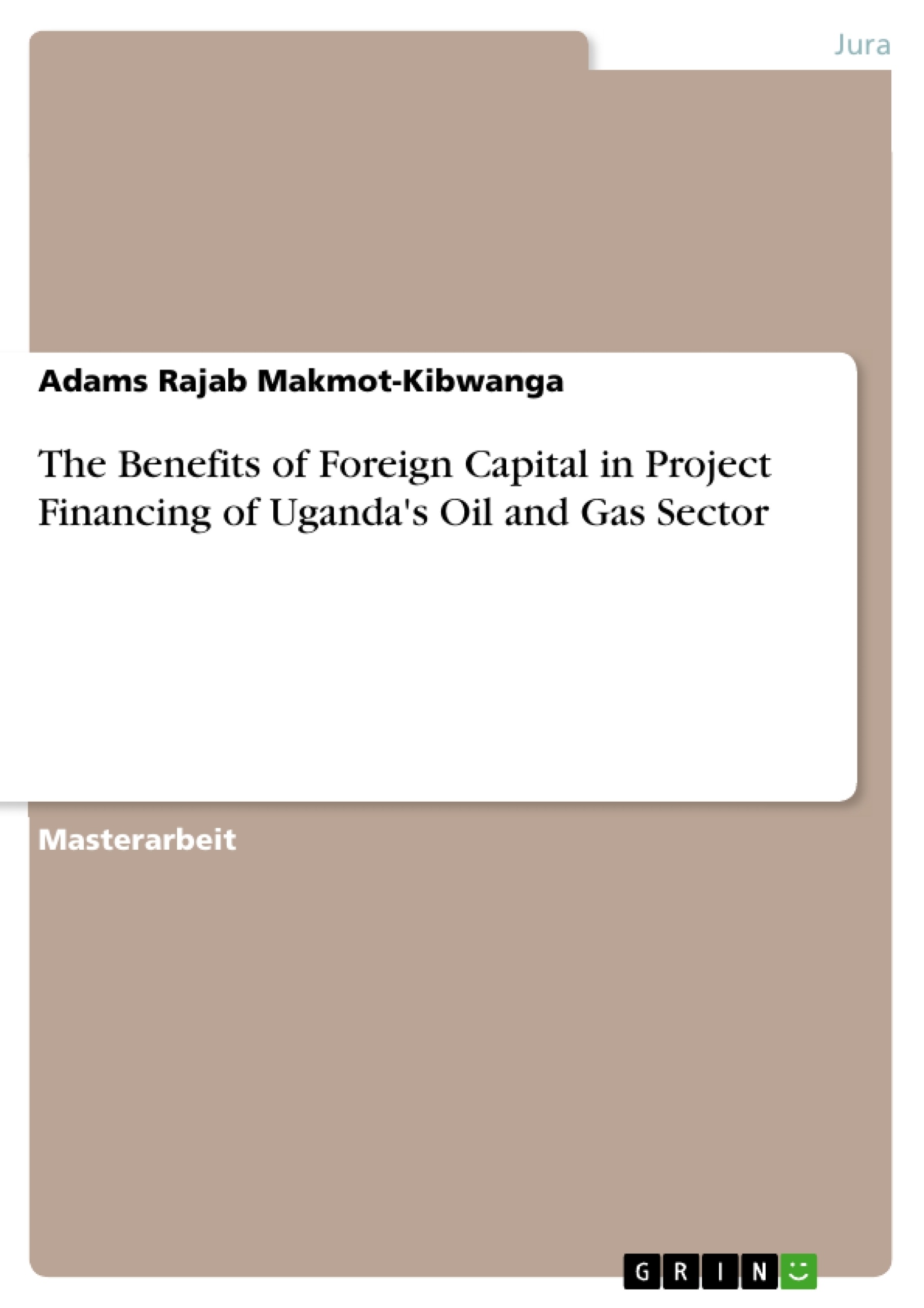The main purpose of this study is to carry out a critical analysis of the benefits of foreign capital in Project Financing in Uganda’s oil and gas sector.
Efforts to find oil in Uganda started as far back as the 1980s. However, the initial efforts were not successful in establishing commercially viable deposits in the country. Renewed and consistent exploration efforts commenced in 1980 which culminated into confirmation of commercially viable oil in 2006 . The companies currently licensed to explore, develop and produce petroleum in Uganda are; China National Offshore Oil Corporation Uganda Limited (CNOOC), Total and Total E& P. All these are aimed at facilitating investments in the oil and gas sector.
These company had to seek foreign capital to facilitate the major projects of oil exploration and development and to ensure a steady cash flow of funds to cater for the projects through project financing. This is very critical for the success of any project undertaken by the parties. Most developing countries looking for capital and the only way how they can finance their projects is through project financing in which they receive the continuous flow of cash for the life of the project after guaranteeing the bankability of the project through risk mitigation and other forms of security.
Inhaltsverzeichnis
- Chapter One: Introduction
- 1.1 Background to the Study
- 1.2 Problem Statement
- 1.3 Research Objectives
- 1.4 Research Questions
- 1.5 Significance of the Study
- 1.6 Scope of the Study
- 1.7 Limitations of the Study
- 1.8 Organization of the Study
- Chapter Two: Literature Review
- 2.1 Theoretical Framework
- 2.2 Conceptual Framework
- 2.3 Review of Related Literature
- 2.4 Empirical Review
- 2.5 Gap in the Literature
- Chapter Three: Research Methodology
- 3.1 Research Design
- 3.2 Population and Sampling Techniques
- 3.3 Data Collection Methods
- 3.4 Data Analysis Techniques
- Chapter Four: Analysis of Findings
- 4.1 Presentation of Findings
- 4.2 Discussion of Findings
- Chapter Five: Summary of Findings, Conclusion and Recommendations
- 5.1 Summary of Findings
- 5.2 Conclusion
- 5.3 Recommendations
- References
- Appendix I
- Appendix II
Zielsetzung und Themenschwerpunkte
Diese Dissertation untersucht die Vorteile ausländischer Investitionen bei der Projektfinanzierung im ugandischen Öl- und Gassektor. Sie analysiert die Herausforderungen, die durch diese Finanzierung entstehen, und erörtert die möglichen Auswirkungen auf die nachhaltige Entwicklung Ugandas.
- Die Rolle ausländischer Kapitalinvestitionen bei der Finanzierung von Öl- und Gasprojekten in Uganda
- Die Vorteile und Nachteile der Einbindung ausländischen Kapitals in den ugandischen Öl- und Gassektor
- Die Auswirkungen von ausländischen Investitionen auf die nachhaltige Entwicklung Ugandas
- Die rechtlichen und regulatorischen Rahmenbedingungen für ausländische Investitionen im ugandischen Öl- und Gassektor
- Die Bedeutung von Transparenz und Rechenschaftspflicht im Zusammenhang mit ausländischen Investitionen
Zusammenfassung der Kapitel
Kapitel Eins führt die Thematik der Dissertation ein und stellt den Kontext der Untersuchung dar. Es werden der Problemstand, die Forschungsziele und die Bedeutung der Arbeit erläutert. Kapitel Zwei befasst sich mit der Literaturrecherche, die die theoretischen und konzeptionellen Grundlagen der Untersuchung erörtert. Es werden relevante Studien und Theorien in Bezug auf ausländische Investitionen und Projektfinanzierung im Öl- und Gassektor analysiert. Kapitel Drei behandelt die Forschungsmethodik und beschreibt die angewandten Methoden zur Datenerhebung und -analyse. Kapitel Vier präsentiert die Ergebnisse der Analyse und interpretiert die gewonnenen Erkenntnisse. Die Diskussion der Ergebnisse beleuchtet die Rolle ausländischer Investitionen im ugandischen Öl- und Gassektor und analysiert die Auswirkungen auf die nachhaltige Entwicklung des Landes.
Schlüsselwörter
Ausländische Investitionen, Projektfinanzierung, Öl- und Gassektor, Uganda, nachhaltige Entwicklung, rechtliche Rahmenbedingungen, Transparenz, Rechenschaftspflicht
Häufig gestellte Fragen
Warum ist ausländisches Kapital für Ugandas Ölsektor so wichtig?
Große Ölprojekte erfordern enorme Investitionen, die durch Projektfinanzierung und ausländisches Kapital gedeckt werden, um einen stetigen Cashflow zu gewährleisten.
Welche Unternehmen sind derzeit im ugandischen Ölsektor lizenziert?
Zu den lizenzierten Unternehmen gehören die China National Offshore Oil Corporation (CNOOC) sowie Total und Total E&P.
Wie sichern Banken Projekte in Entwicklungsländern ab?
Durch Risikominderung (Risk Mitigation) und verschiedene Formen der Sicherheit wird die „Bankability“ eines Projekts garantiert.
Welche Auswirkungen haben diese Investitionen auf die nachhaltige Entwicklung?
Die Dissertation analysiert sowohl die wirtschaftlichen Vorteile als auch die Herausforderungen für die langfristige nachhaltige Entwicklung Ugandas.
Wann wurde in Uganda erstmals kommerziell nutzbares Öl bestätigt?
Nach ersten Bemühungen in den 1980er Jahren wurde im Jahr 2006 die Existenz von kommerziell lebensfähigen Ölreserven bestätigt.
- Quote paper
- Adams Rajab Makmot-Kibwanga (Author), 2021, The Benefits of Foreign Capital in Project Financing of Uganda's Oil and Gas Sector, Munich, GRIN Verlag, https://www.grin.com/document/1361249



